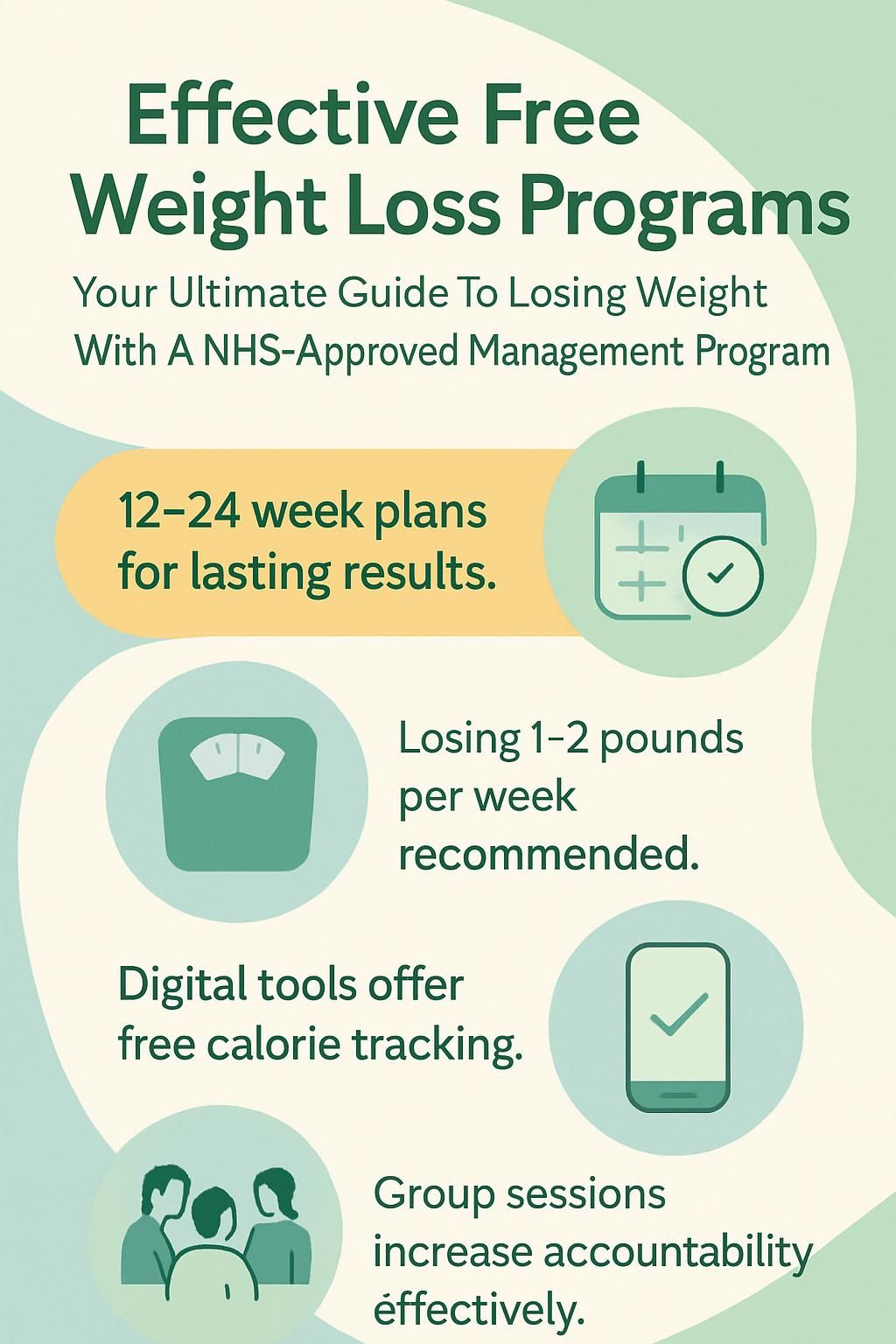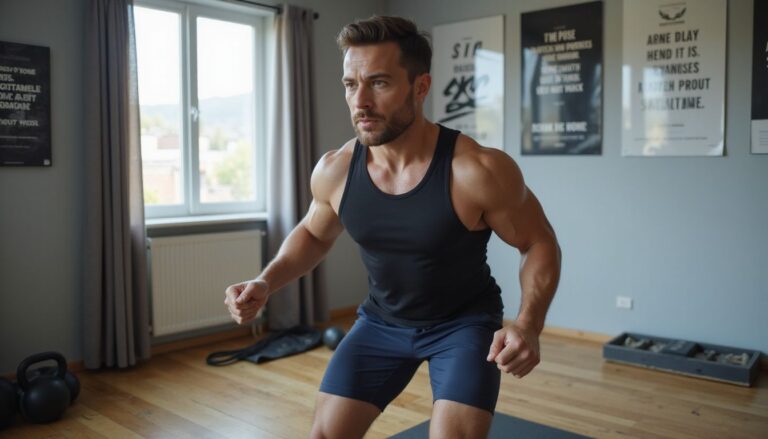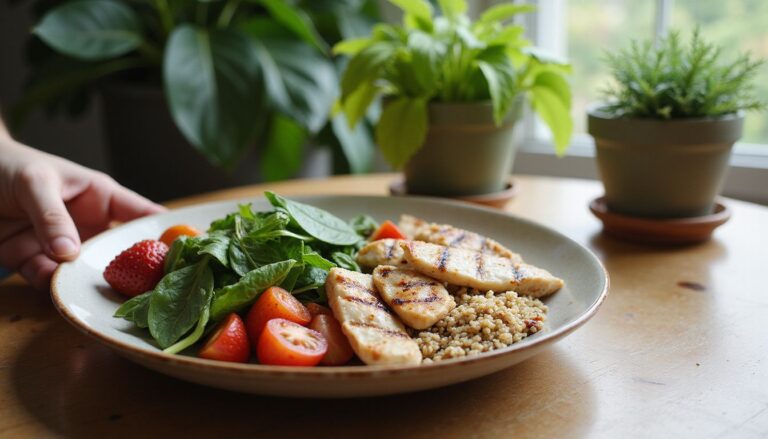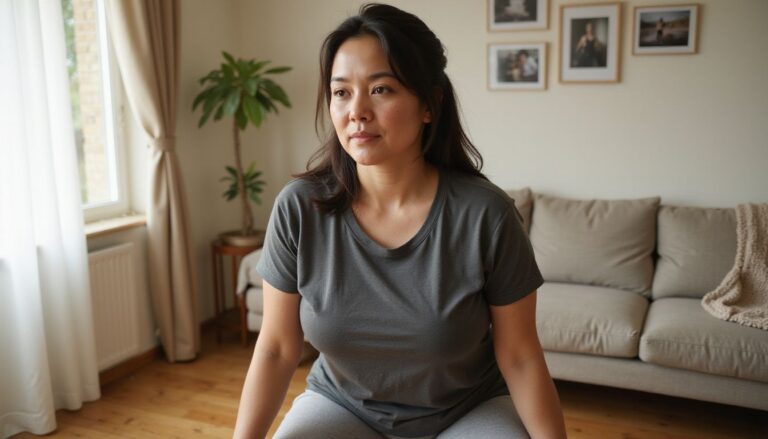Effective Free Weight Loss Programs: Your Ultimate Guide To Losing Weight With A NHS-Approved Management Program
Our Nutrition Assistant AI Suite will transform your body. You will lose fat, get toned, and build muscle. Gain confidence and optimal health.
If you are trying to lose excess weight or keep it off, you are not alone. Free weight loss programs backed by the NHS offer practical steps built on science, not quick fixes. Evidence from respected sources like the Mayo Clinic Diet also guides many of the strategies in this guide.
In this guide, you will find simple steps for choosing a management program, tips for sticking to a diet plan, and advice on using a weight loss app to reach a healthy weight. You will also learn how tracking, group support, and steady habits help you reach your goal weight without guesswork.
This guide is educational and does not replace medical advice. Talk with your healthcare provider before starting any new plan, especially if you have a medical condition.
Key Takeaways
- NHS-approved free programs such as the NHS Digital Weight Management Program use evidence-based strategies, offering 12 to 24 week plans for lasting results. The Mayo Clinic Diet follows similar science and methods.
- Programs offer meal and activity plans that consider conditions like type 2 diabetes or hypertension, with guidance from dietitians or healthcare providers.
- Digital tools, including MyFitnessPal, Lose It!, FitOn, and the NHS Weight Loss Plan app, provide calorie tracking, workouts, and community support without required fees for core features.
- Most effective programs aim for 1 to 2 pounds per week after an early two-week drop of 6 to 10 pounds (Wing RR et al., Archives of Internal Medicine).
- Group coaching in YMCA programs and EFL Trust FIT FANS builds accountability and helps you keep healthy habits for long-term weight management.

Why Should You Choose Free Weight Loss Programs?

Free options lower barriers so you can focus on progress, not price. They offer clear steps for healthy eating and steady changes that add up over time.
How Are Free Weight Loss Programs Accessible and Affordable?
Apps like the NHS Weight Loss Plan are free to download on the App Store and Google Play. You can join EFL Trust FIT FANS for 12 weeks or use Local Authority Weight Management Services at no direct cost if you qualify due to excess body weight.
The NHS Digital Weight Management Program offers a free 12 week online plan for adults living with obesity, including those with type 2 diabetes or hypertension. You can use calorie tracking tools like MyFitnessPal at no charge for core features, which helps you monitor food choices and exercise habits daily. FitOn provides free workout classes led by coaches, which makes starting physical activity easier.
These resources do not require health insurance or up-front fees. With a smartphone or internet connection, you can get started. Tracking meals each day helped me stay aware of portions while saving money compared with paid services.
What Guidance Do Free Programs Offer for Different Lifestyles?
Free weight loss programs provide flexible guidance for different lifestyles, dietary needs, and health goals. The Mayo Clinic Diet outlines eight meal plan styles, including gluten-free, vegetarian, Mediterranean, and higher protein options. While the full program is paid, its public guidance reflects decades of clinical nutrition research.
These plans help you make healthier food choices that fit your habits and your health. The NHS Digital Weight Management Program welcomes adults with obesity and related conditions so your plan reflects your preferences and medical needs.
The NHS Weight Loss Plan app helps you set goals, swap foods you enjoy, and pace your progress. FitOn adds short, guided workouts you can do at home, a useful option if you have a busy schedule.
YMCA groups focus on lasting changes through weekly sessions and peer support. The Body Coach app offers structured routines so you can stay physically active at home or at the gym.
How Do Free Programs Support Long-Term Weight Management?
Free programs focus on building healthy habits you can keep. The Mayo Clinic Diet shows how research-based steps improve results, including food tracking, practical dietary advice, and activity goals. The NHS 12 Week Weight Loss Plan app breaks big goals into small, clear steps.
Community support makes new routines easier to maintain. Many programs include weekly group sessions for encouragement and accountability. The Mayo Clinic Diet’s LIVE IT phase teaches lifelong strategies that help you maintain a healthy weight.
Coaching and feedback help you move past plateaus and avoid regaining weight.
Sustainable change happens through small steps repeated over time.
NHS-Approved Weight Loss Programs Overview
NHS-approved programs help you lose weight safely using structured plans for activity, diet changes, and behavior support. Clear guidance reduces guesswork and improves your chance of success.
What Is the NHS Digital Weight Management Program?
The NHS Digital Weight Management Program is a free 12 week online plan for adults who want to lose weight safely. You may qualify if you live with obesity or have conditions like type 2 diabetes or hypertension. A healthcare professional must refer you to join.
Once enrolled, you receive personalized meal plans, activity recommendations, and practical dietary advice. Built-in tools help you track your progress each week and strengthen healthy habits for long-term results.
How Does the 12-Week NHS Weight Loss Plan App Work?
Download the free NHS Weight Loss Plan app from the App Store or Google Play. Use it to set goals, plan meals, and make healthy food swaps that fit your routine. The app introduces calorie counting and healthy eating tips based on NHS guidance.
Track physical activity and daily steps with its pedometer feature and see progress in real time. Enter your height and weight into the BMI calculator to monitor changes. Most adults can use this fitness app, especially if you want help managing heart health or type 2 diabetes.
The plan promotes safe weight loss at about 1 to 2 pounds per week and helps you build habits that keep weight off.
What Are Local Authority Weight Management Services?
Local Authority Weight Management Services offer free support for adults with excess body weight. These services partner with the NHS and aim to help you achieve and maintain a healthy weight using behavior change methods.
If your BMI or other local criteria qualify, you can access nearby services. Some areas offer group sessions on healthy eating, meal planning, stress management, and emotional eating. Others provide one-on-one support based on local resources.
Weekly check-ins can help you track progress and stay on realistic goals while feeling supported. Group tools like calorie tracking apps and shared recipes make daily changes easier.
Benefits of NHS-Approved Weight Loss Programs
NHS-approved programs combine proven strategies, practical tools, and coaching so you can lose weight and improve your health. The steps are clear and backed by research.
How Do Personalized Meal and Activity Plans Help?
Personalized plans match your health history and food preferences. The NHS Weight Loss Plan app lets you set goals, track progress, and design meals that fit your needs. The Mayo Clinic Diet uses your diet history to offer meal styles like gluten-free and vegetarian. This helps people with diabetes or high blood pressure manage weight safely.
You avoid generic diets that ignore preferences or allergies. Local Authority services adapt to regional needs so coaching is practical where you live. Tracking my meals helped me see habits that worked and avoid stress snacks like chocolate during long workdays.
Planning activities you enjoy builds motivation. A short walk or a HIIT session can become your go-to stress reliever instead of food.
What Is the Evidence-Based Approach in These Programs?
Evidence-based methods keep your changes on track. NHS-approved programs and the Mayo Clinic Diet use behavior change science and clinical nutrition research. They focus on what works, not on cutting whole food groups without cause.
The NHS Weight Loss Plan app uses clinical guidance on calorie targets, dietary fiber, whole grains, sleep, stress, and fitness routines. When I used an NHS digital plan, clear education on portions and regular feedback made progress easier to see within weeks.
These structured approaches can reduce the risk of type 2 diabetes and heart events while helping you maintain results. Practical steps and steady support help you handle setbacks.
How Do These Programs Support Conditions Like Type 2 Diabetes and Hypertension?
NHS-approved programs provide focused support for type 2 diabetes and high blood pressure. The NHS Digital Weight Management Program serves adults with obesity and related conditions. Personalized plans guide calorie intake, carbohydrate choices, and activity to help keep blood sugar stable.
The Mayo Clinic Diet includes a Diabetes plan to support prediabetes or type 2 diabetes. A Heart Health option targets blood pressure and cholesterol. Some people also use these tools alongside weight loss medications under medical supervision.
Working with your doctor or a registered dietitian nutritionist improves safety and results.
Popular Free Weight Loss Programs and Tools
Free tools help you eat better, move more, and track progress. Mixing a structured plan with the right app often gives the best results.
What Is the EFL Trust FIT FANS Program?
EFL Trust FIT FANS is a 12 week group program for football fans that meets in local sports venues. With NHS support, eligible adults with excess weight can join for free. Each session covers healthy eating, stress management, and simple ways to stay active.
Coaches use proven strategies and have you track weight and set realistic goals. FIT FANS is available at many clubs across England and supports lasting changes in eating habits and activity routines.
How Does YMCA’s Free Weight Loss Program Work?
You attend in-person group sessions led by trained staff at participating YMCA locations. The focus is sustainable lifestyle change through nutrition education and regular activity, not fast fixes. Group support adds accountability and motivation.
Sessions often cover calorie tracking, low calorie recipes, fruit and vegetable ideas, and the Mediterranean diet pattern for heart health. Many programs run several weeks, which helps you build habits in a supportive setting. In my 10 week YMCA group, peer encouragement helped me stick to workouts and track progress with apps like Google Fit.
What Is the NIH Body Weight Planner and How to Use It?
The NIH Body Weight Planner is a free tool from the National Institutes of Health. Enter your weight, age, activity level, and goals to receive calorie and activity targets for healthy weight loss or maintenance.
This calculator accounts for metabolic changes over time and can be updated as you progress. It is available online at no cost for adults 18 years or older in the United States. Many people use it alongside NHS-approved programs, FitOn workouts, or tips from insurers like Blue Cross Blue Shield.
Tracking with the NIH planner helps you set realistic targets, such as losing 10 pounds safely through steady habits.
How Can FitOn Online Workout Platform Support Weight Loss?
FitOn offers free on-demand workouts, including Pilates, yoga, and HIIT. You can stream sessions at home or while traveling. Celebrity trainers lead many classes, which keeps ideas fresh and motivation high.
Routines fit all fitness levels and support daily physical activity for calorie burn. You can build a simple weekly schedule around your work or family life. A supportive community helps you stay on track.
Short daily HIIT sessions helped me improve stamina and speed progress compared with working out alone.
What Are the Best Free Weight Loss Apps to Try?
Free apps give you tracking tools, healthy recipes, and simple plans. They turn goals into daily actions you can see and measure.
How Can MyFitnessPal Assist Your Weight Loss Journey?
MyFitnessPal makes it easy to track food, activity, and weight. A large food database and barcode scanning simplify calorie counting and help you see trends. You can set custom goals and view your progress in one place.
The app shows both calorie intake and calories burned, which supports smarter food choices. MyFitnessPal also integrates with other fitness apps like FitOn. Community features offer extra encouragement. Logging every meal helped me spot hidden calories that slowed my progress.
What Features Does Lose It! Offer?
Lose It! helps you log meals and activity daily with quick barcode scanning and a large food and exercise database. You can set weight loss goals and view charts that show changes over time.
Personalized plans keep you focused on healthy meals, while insights reveal patterns so you can adjust. Community support adds accountability through shared tips and wins. I found barcode scanning especially helpful after a program suggested closer tracking of snacks.
How Does The Body Coach App Help with Weight Loss?
The Body Coach app offers meal plans and video-guided workouts that match your goals. Recipes cover a range of preferences, which makes healthy choices easier.
You can train at home and adjust intensity as your fitness grows. The community provides support and shared motivation. At about £1.55 per week with an annual plan, the tools can fit many budgets without expensive equipment or medications like semaglutide.
What Does the WeightWatchers (WW) Free Tier Include?
New users can try the WeightWatchers free tier for four weeks. You get basic tracking tools to log food, activity, and weight. Daily and weekly progress reports help you see trends.
Set goals, plan meals, and explore recipe ideas within your calorie target. The community feature offers support and motivation. If you want more features after the trial, paid upgrades are available. Using the free tools helped me build a logging habit without a financial commitment.
Key Features of Effective Free Weight Loss Programs
Effective free programs share a few core traits. Personalized diet plans, smart tracking tools, and community support keep you moving toward your weight loss goals.
Why Are Personalized Diet Plans Important?
Personalized plans match your health, preferences, and schedule. The Mayo Clinic Diet outlines eight meal styles, like gluten-free and vegetarian. NHS and Local Authority services also shape advice using your BMI and medical history.
Programs can adjust for diabetes, heart conditions, or GLP-1 medications. Research shows tailored meal planning leads to better long-term results than generic diets. When the plan fits your life, you are more likely to stay consistent.
How Do Tracking Tools Help Monitor Calories and Activity?
Tracking tools give you a clear picture of calorie intake and physical activity. Apps like MyFitnessPal, Lose It!, and the NHS Weight Loss Plan let you log meals and workouts on your phone or computer. The Mayo Clinic Diet provides daily food logs and exercise records to spot patterns.
With instant feedback, you can adjust habits in real time. Progress charts keep you motivated as you see steady weight loss. Community forums inside these apps add support so you are not doing it alone.
How Does Community Support Boost Motivation?
Group coaching in the Mayo Clinic Diet and YMCA programs connects you with people who share your goals. Weekly sessions in EFL Trust FIT FANS build accountability and make healthy changes feel doable.
The NHS Weight Loss Plan app includes user communities for tips and support. MyFitnessPal and FitOn also offer chat features for peer encouragement. Sharing milestones and struggles raises commitment and keeps you going on tough days.
How Can You Get Started with a Free Weight Loss Program?
Getting started is easier with a short checklist. A few simple steps help you pick the right option and set realistic targets.
How to Assess Your Weight Loss Goals and Needs?
Begin with a short assessment of your diet history, food preferences, and target weight. The NHS BMI calculator gives you a baseline and suggests healthy targets. Programs like the Mayo Clinic Diet also ask about stress or past dieting challenges to shape an effective plan.
Many tools prompt you to set a clear time frame, such as 12 or 24 weeks. Review daily routines to spot barriers like low activity or frequent snacking. Set goals that are specific and time bound, such as walking 30 minutes five days a week.
How to Choose the Right Program or App for You?
Look at structure first. A 12 week program, in-person sessions, or a self-guided app may fit you differently. If you like logging, pick MyFitnessPal or Lose It!. If you want a structured plan, consider the NHS Digital Weight Management Program or the NHS Weight Loss Plan app.
Match features to your lifestyle. If you eat gluten-free or vegetarian meals, choose plans that support those. Some apps excel at calorie tracking. Others focus on workouts or community support. If you have diabetes or high blood pressure, choose NHS-approved options that align with medical guidance.
Check reviews, then use free trials before you commit long term. This saves time and money and helps you find the best fit.
What Are Realistic Expectations for Weight Loss?
Most programs suggest 1 to 2 pounds per week after the first phase. In the first two weeks, many people lose 6 to 10 pounds as the body adjusts. Over three months, a 5 percent loss of starting weight is common with steady engagement.
With strong commitment, some people lose up to 13 percent of body weight in six months. I saw early success with a free app, then progress slowed to a steady weekly pace. Focus on habits that last, not extreme changes.
How to Monitor Progress and Stay Consistent?
Use daily trackers in free apps like MyFitnessPal, the NHS Weight Loss Plan, or the Mayo Clinic Diet to log meals and exercise. A digital journal shows your calorie intake and physical activity each day.
Schedule weekly or monthly check-ins to review goals, note improvements, and find areas to change. Enable reminders for weigh-ins. Join group coaching or online communities for extra accountability. Adjust meal plans when progress stalls, and celebrate small wins like a new step record.
When I hit a plateau, logging my evening snacks revealed an easy fix. Cutting those helped me see progress again in two weeks. People who track regularly are more likely to succeed in long-term weight management than those who do not track[1].
NHS-Approved Healthy Eating Tips
Healthy eating is the base of any weight loss plan. Simple choices add up, especially when you track them.
How Can You Simplify Calorie Counting?
Use MyFitnessPal and Lose It! to log meals quickly. Both include food databases, barcode scanners, and tools to speed up entries. The free NHS Weight Loss Plan app calculates daily calorie needs based on your goals.
Follow meal plans that prioritize whole foods so you are not counting every bite. Portion control plates and smart swaps can cut calories without much math. For desserts, keep portions near 75 calories per day, or save them for a larger treat once or twice a week.
What Nutrients Should You Incorporate for Weight Loss?
Focus on nutrient-rich foods like vegetables, fruits, whole grains, nuts, seeds, and beans. These foods provide fiber, which helps you feel full longer. Aim for lean protein at each meal to support muscles and satiety.
Fish a few times per week adds healthy fats. The Mediterranean pattern highlights beans and fish for balanced meals. Limit saturated fat and added sugar. Choosing whole foods over processed snacks helped me feel satisfied without overeating.
What Are Some Easy Recipes for Balanced Meals?
Try overnight oats with rolled oats, low-fat milk, fresh berries, and sliced pear for a fiber-rich breakfast. For lunch, make Tuscan white bean soup with a spoon of pesto for protein and healthy fats.
For dinner, roast chicken breast with broccolini, onion, and cherry tomatoes on one tray for quick cleanup. Caribbean tofu and sweet potato curry offers plant-based protein in a mild tomato sauce. Snack on sliced bell peppers or a banana for potassium. Keep dessert near 75 calories per day using fruit or a small yogurt.
These ideas work for many gluten-free or vegetarian needs and fit busy schedules.
What Is the Role of Physical Activity in Weight Loss?
Activity acts like a spark for weight management. It helps you burn calories, preserve muscle, and feel better day to day.
What Exercises Are Recommended for Weight Management?
- Walk briskly most days to increase calorie burn. The NHS suggests at least 150 minutes of moderate activity per week.
- Do resistance training like push-ups, squats, or weights two or three times weekly to keep muscle while losing weight.
- Try cycling outside or on a stationary bike for low-impact cardio that strengthens your legs and core.
- Join EFL Trust FIT FANS or similar groups for motivation and structure.
- Use The Body Coach app for guided routines with simple equipment or body weight moves.
- Stream FitOn classes in Pilates, yoga, HIIT, and strength to improve flexibility, heart health, and endurance.
- Add short HIIT sessions twice weekly to boost metabolism if your doctor approves.
- Choose activities you enjoy so you will stick with them.
- Start with shorter sessions if you are new, then increase time as you feel stronger.
- Make small changes, take stairs, park farther away, or cycle to work.
Mixing cardio and strength helps you burn more calories and stay consistent over time.
How Can You Stay Active Every Day?
Build movement into your routine. Aim for at least 30 minutes of daily activity for weight loss and health. Short 10 minute bursts count. Walk during breaks, take the stairs, or do quick chores that raise your heart rate.
Use FitOn for short workouts that fit your schedule. Set phone reminders to get up and move. YMCA or EFL Trust FIT FANS groups add structure and fun through team support. Pick activities you enjoy so they become habits you keep.
Group walks in my community kept me consistent. Tracking daily steps made movement feel rewarding, not like a chore.
How to Address Common Weight Loss Challenges
Every journey has bumps. A few practical moves can help you handle plateaus, emotional eating, and low motivation.
How to Overcome Weight Loss Plateaus?
Plateaus are common. Adjust your routine or meal plan to spark progress. Use MyFitnessPal or the NHS Weight Loss Plan app to spot patterns that may need a change.
Join group coaching for new ideas and peer support. Celebrate non-scale wins like more energy or better sleep. Recheck your goals every few weeks and make small updates to keep moving forward.
What Strategies Help Manage Emotional Eating?
Track mood and eating triggers in your app each day. Try mindful eating strategies, like slowing down and rating hunger before snacks. The NHS Mind Plan can offer mental health tips that support your efforts.
Use peer groups to talk about stressful moments. If emotions drive eating, speak with a healthcare professional. The Beat charity also offers resources for eating disorder support.
How to Stay Motivated Over Time?
Use group coaching and peer support to refill your motivation. App reminders and positive feedback help you stay engaged. I felt my energy dip after a few weeks once, and weekly sessions brought it back.
Set new goals as you meet old ones so interest stays high. Online forums increase accountability. The two-phase Mayo Clinic Diet structure helps people commit longer and see results that last. Your inner drive matters most, no matter which tool you use.
FAQs About Free Weight Loss Programs
You may have questions about costs, support, and likely results. These short answers help you choose with confidence.
Are Free Programs as Effective as Paid Ones?
Free programs and paid plans can both work if they fit your needs and you stay consistent. MyFitnessPal offers a free tracker and community that help many people stay on target. YMCA groups provide no-cost coaching that builds strong habits.
Many free assessments create personalized diet guidance based on your health targets. Some programs include sessions with registered dietitians and use mindful eating techniques. Results depend on engagement, not just price.
How Much Weight Can I Expect to Lose?
With evidence-based programs, many people lose 6 to 10 pounds in the first two weeks. Over three months, a 5 percent loss of starting weight is common with steady effort. In six months, engaged users may reach up to 13 percent loss.
After the first phase, expect about 1 to 2 pounds per week. Your results depend on age, health status, activity level, and how well you follow the plan.
Do These Programs Provide Medical Support?
NHS-approved free programs may include access to trained staff such as dietitians or health coaches. Plans align with medical guidance for conditions like type 2 diabetes or hypertension. The Mayo Clinic Diet provides expert guidance as part of its paid plan.
Always speak with your healthcare provider before starting any program, especially if you take medications or have health conditions.
Conclusion
Choosing a free NHS-approved weight loss program gives you credible support and clear steps for weight management. You get personalized meal plans, expert-backed dietary advice, and tracking tools that make change visible. Evidence-informed programs like the Mayo Clinic Diet show why steady habits work and how progress continues.
Use local services or digital apps that match your lifestyle and health history. Aim for realistic goals, like 1 to 2 pounds per week, and pair healthy eating with regular physical activity. Community support and professional guidance keep you motivated. Start small today, and keep going. Those small steps add up to lasting results.
Safety note: This content is for education. It is not a substitute for medical advice. Work with your healthcare provider if you have health conditions or take prescription medications.
FAQs
1. What makes NHS-approved weight management programs effective for losing weight?
NHS-approved weight management programs use evidence-based methods, such as calorie tracking and regular physical activity. These plans often include support from healthcare professionals and access to educational resources. Studies show participants in these programs lose more body fat compared to those who try to manage alone.
2. Are free weight loss programs safe for everyone?
Most free NHS-backed plans are designed with safety in mind and follow clinical guidelines. They screen for health conditions before starting, which helps protect users with medical issues like diabetes or heart disease. Always consult a doctor if you have concerns about your health before joining any program.
3. How do I join an NHS-supported free weight loss program?
You can sign up through your local clinic or the official website of the National Health Service by filling out a short form about your current habits and goals. After registration, you may receive digital tools, meal guides, or group sessions led by trained staff.
4. Can I expect long-term results from these programs?
Research shows that people using structured guidance maintain healthier weights over time than those without support^1^. Consistent participation is key; following advice on nutrition and exercise increases success rates significantly.
Summary:
NHS-endorsed plans offer proven strategies backed by research data and professional oversight; they provide accessible entry points for most adults seeking lasting change.
___
^1^ Public Health England (2020). “Weight Management: Evidence-Based Interventions.”







